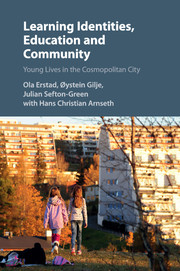Book contents
- Learning Identities, Education, and Community
- Learning Identities, Education, and Community
- Copyright page
- Contents
- Figures
- Tables
- Book part
- 1 Introduction: The Learning Lives of Groruddalen
- 2 Groruddalen: Norway Goes Global
- 3 From Studying Young People to Creating Narratives of Learning Lives
- 4 Negotiating Cultural Identities: Outdoor Play, Classroom Discussions, and Future Orientation
- 5 Learning Identities: On the Boundaries between Work and Play
- 6 Forming Learning Identities through Narrative
- 7 Making Choices to Make a ‘Future’: How Community, the Valley, and the Nation Frame Possibilities
- 8 Schooling for Tolerance: Dealing with Conflict and Controversy
- 9 Conclusion: The Learning Lives of New Norwegians
- Appendices
- References
- Index
9 - Conclusion: The Learning Lives of New Norwegians
Published online by Cambridge University Press: 05 July 2016
- Learning Identities, Education, and Community
- Learning Identities, Education, and Community
- Copyright page
- Contents
- Figures
- Tables
- Book part
- 1 Introduction: The Learning Lives of Groruddalen
- 2 Groruddalen: Norway Goes Global
- 3 From Studying Young People to Creating Narratives of Learning Lives
- 4 Negotiating Cultural Identities: Outdoor Play, Classroom Discussions, and Future Orientation
- 5 Learning Identities: On the Boundaries between Work and Play
- 6 Forming Learning Identities through Narrative
- 7 Making Choices to Make a ‘Future’: How Community, the Valley, and the Nation Frame Possibilities
- 8 Schooling for Tolerance: Dealing with Conflict and Controversy
- 9 Conclusion: The Learning Lives of New Norwegians
- Appendices
- References
- Index
Summary
- Type
- Chapter
- Information
- Learning Identities, Education and CommunityYoung Lives in the Cosmopolitan City, pp. 216 - 232Publisher: Cambridge University PressPrint publication year: 2016

